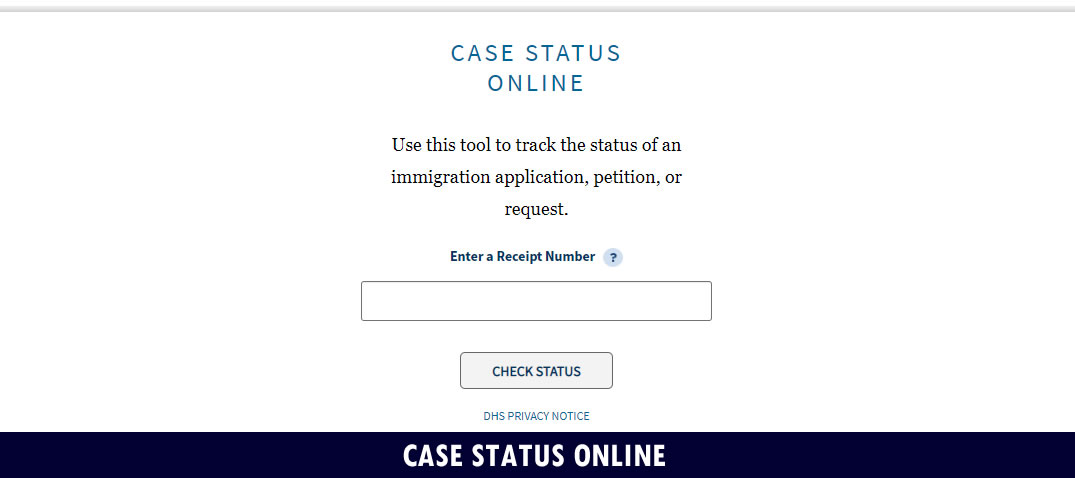
We are often asked how to verify the case status. It is a very simple process. You can verify your case status online from your home or office...

The Department of Homeland Security (DHS) announced a new process that will enable Afghan nationals to renew their parole and continue to live and work in the United States. The new process is streamlined and will be at no cost, and will provide for a two-year renewal of parole for qualifying individuals. This action is part of the Biden-Harris Administration’s ongoing commitment to the safety, security, and well-being of the thousands of Afghan nationals who arrived in the United States through Operation Allies Welcome and Enduring Welcome.
“DHS is proud to have led Operation Allies Welcome and we are committed to supporting our Afghan allies as they continue to settle into their communities across the country,” said Secretary of Homeland Security Alejandro N. Mayorkas. “Through this new streamlined and fee-exempt process, eligible Afghan nationals will be able to continue living and working here as they pursue a permanent status.”
Afghan national who are currently parolees may now apply for a renewal of their parole and employment authorization through a new streamlined and fee-exempt application process that is available online and on paper and that uses Form I-131, Application for Travel Document. The renewal requests will be considered on a case-by-case basis for urgent humanitarian reasons and for a significant public benefit.
DHS will also consider a two-year extension of parole for those Afghan parolees who applied and continue to apply for asylum (Form I-589) or for adjustment of status to that of lawful permanent resident (Form I-485) (for example, adjustment of status as a special immigrant). The extensions will be considered on a case-by-case basis for urgent humanitarian reasons and for a significant public benefit. If an extension is approved, the applicant’s original employment authorization will be extended and sent to the applicant’s last address of record with USCIS.
The Administration has repeatedly put forward an adjustment act and publicly called on Congress to support a bipartisan adjustment act that would provide a durable, more streamlined immigration pathway for those currently in parole.
Afghan nationals are encouraged to pursue a permanent status in the United States for which they may be eligible, including through the Special Immigrant and asylum processes. On May 17, 2023, DHS began hosting Afghan Support Centers across the country – the first two were held in Phoenix and Tucson, Arizona, and the next Afghan Support Center will be held June 21-24 at the SAFE Credit Union Convention Center in Sacramento, California. U.S. government personnel and nongovernmental organizations at the Afghan Support Centers will provide information regarding immigration and social services available for those who arrived through Operation Allies Welcome and Enduring Welcome. Additional dates and locations for Afghan Support Centers will be announced in the coming weeks.
Effective June 8, 2023, certain additional Afghan parolees are employment authorized incident to parole. This updated guidance applies to certain Afghan parolees whose unexpired Form I-94, Arrival/Departure Record, contains a class of admission of “PAR” and indicates Afghanistan as the country of citizenship on the document, if their parole has not been terminated. These parolees are also exempt from fees to apply for an initial Employment Authorization Document (EAD) or to replace an initial EAD.
As a matter of policy, USCIS is providing certain Afghan and Ukrainian parolees with the benefit of employment authorization incident to parole, as we typically provide refugees incident to status, and a no-fee initial EAD (and replacement of an initial EAD). Providing these parolees similar treatment to refugees aligns with the spirit of legislation that states that parolees covered by the legislation “shall be eligible for . . . other benefits available to refugees admitted under section 207 of the Immigration National Act (8 U.S.C. 1157).”
On Nov. 21, 2022, we announced we would provide certain Afghan and Ukrainian parolees with employment authorization incident to parole and also exempted the fee to file Form I-765, Application for Employment Authorization, for Ukrainian parolees filing for an EAD by mail. Afghan parolees were already exempt from the fee for an initial paper-filed Form I-765 (and a replacement EAD) through Sept. 30, 2023.
This updated guidance clarifies the parolees considered employment authorized incident to parole include all the following:
For these parolees, their unexpired Form I-94 is an acceptable receipt they may present to their employer to show their identity and employment authorization for the purposes of Form I-9, Employment Eligibility Verification. This satisfies the Form I-9 requirement for up to 90 days from the date of hire (or in the case of reverification, the date employment authorization expires). Individuals who received a Form I-94 when they entered the United States should visit CBP’s Form I-94 page to view and print a copy of their Form I-94. If you do not have a passport, you can use your A-Number to retrieve your Form I-94 online at the site above by choosing “Get Most Recent I-94.” Enter your A-Number in the Document Number field and enter your country of citizenship or “USA” in the Country of Citizenship field.
After 90 days (or when the Form I-94 expires, if sooner), parolees must present an unexpired EAD or unrestricted Social Security card and acceptable List B identity document from the Form I-9 Lists of Acceptable Documents (such as a state-issued driver’s license or identification card). Ukrainian and Afghan parolees must still file Form I-765 to receive a physical EAD. We will provide additional guidance for employers to complete Form I-9.
Under DHS regulations, refugees are authorized employment incident to status, and under current policy and practice, USCIS does not charge refugees a fee with their initial Form I-765 (or a Form I-765 filed to replace an initial EAD). Parolees, however, are not employment authorized incident to parole and must pay a fee (currently $410) to request an EAD, unless we waive or exempt the fee.

